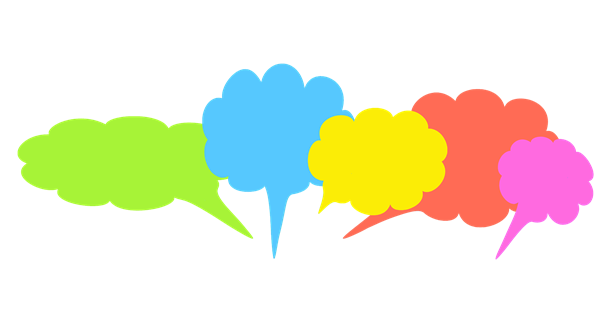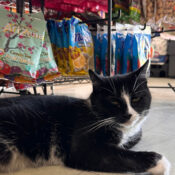Today we mark Thesaurus Day, the anniversary of the birth in 1779 of Mark Peter Roget, author of 1852’s Thesaurus of English Words and Phrases. Today, the name Roget is synonymous with thesaurus in the same way that Webster means dictionaries. Thesaurus Day isn’t so much about a specific book, tome, volume, publication, or compendium, but is instead a time to reflect on and rejoice in the seemingly infinite variety of the English language.
When we have so many words that mean the same thing, why do we always seem to use the same ones? The following essay from English language expert and logodaedalist Richard Lederer illustrates how the synonym you choose, and how you pronounce it, is largely determined by where you’re from.
All-American Dialects
By Richard Lederer
Midway through John Steinbeck’s epic novel The Grapes of Wrath, young Ivy observes, “Ever’body says words different. Arkansas folks says ’em different, and Oklahomy folks says ’em different. And we seen a lady from Massachusetts, an’ she said ’em differentest of all. Couldn’t hardly make out what she was sayin’.”
One aspect of American rugged individualism is that not all of us say the same word in the same way. Sometimes we don’t even use the same name for the same object.
I was born and grew up in Philadelphia a coon’s age, a blue moon, and a month of Sundays ago — when Hector was a pup. Phillufia, or Philly, which is what we kids called the city, was where the epicurean delight made with cold cuts, cheese, tomatoes, pickles, and onions stuffed into a long, hard-crusted Italian bread loaf was invented.
The creation of that sandwich took place in the Italian pushcart section of the city, known as Hog Island. Some linguists contend that it was but a short leap from Hog Island to hoagie, while others claim that the label hoagie arose because only a hog had the appetite or the technique to eat one properly.
As a young adult I moved to northern New England (N’Hampsha, to be specific), where the same sandwich designed to be a meal in itself is called a grinder — because you need a good set of grinders to chew them. But my travels around the United States have revealed that the hoagie or grinder is called at least a dozen other names — a bomber, Garibaldi (after the Italian liberator), hero, Italian sandwich, rocket, sub, submarine (which is what they call it in California, where I now live), torpedo, wedge, wedgie, and, in the deep South, a poor-boy (usually pronounced poh-boy).
In Philadelphia, we washed our hoagies down with soda. In New England we did it with tonic, and by that word I don’t mean medicine. Soda and tonic in other parts are known as pop, soda pop, a soft drink, Coke, and quinine.
In northern New England, they take the term milk shake quite literally. To many residing in that little corner of the country, a milk shake consists of milk mixed with flavored syrup — and nothing more — shaken up until foamy. If you live in Rhode Island or in southern Massachusetts and you want ice cream in your milk drink, you ask for a cabinet (named after the square wooden cabinet in which the mixer was encased). If you live farther north, you order a velvet or a frappe (from the French frapper, “to ice”).
Clear — or is it clean? — or is it plumb? — across the nation, Americans sure do talk “different.”
What do you call those flat, doughy things you often eat for breakfast — battercakes, flannel cakes, flapjacks, fritters, griddle cakes, hotcakes, or pancakes?
Is that simple strip of grass between the street and the sidewalk a berm, boulevard, boulevard strip, city strip, devil strip, green belt, the parking, the parking strip, parkway, sidewalk plot, strip, swale, tree bank, or tree lawn?
Is it a cock horse, dandle, hicky horse, horse, horse tilt, ridy horse, seesaw, teeter, teeterboard, teetering board, teetering horse, teeter-totter, tilt, tilting board, tinter, tinter board, or tippity bounce?
Is it a crabfish, clawfish, craw, crawdab, crawdad, crawdaddy, crawfish, crawler, crayfish, creekcrab, crowfish, freshwater lobster, ghost shrimp, mudbug, spiny lobster, or yabby?
Depends where you live and who or whom it is you’re talking to.
I figger, figure, guess, imagine, opine, reckon, and suspect that my being bullheaded, contrary, headstrong, muley, mulish, ornery, otsny, pigheaded, set, sot, stubborn, or utsy about this whole matter of dialects makes you sick to, in, or at your stomach.
But I assure you that, when it comes to American dialects, I’m not speaking fahdoodle, flumaddiddle, flummydiddle, or flurriddiddle — translation: nonsense. I’m no all-thumbs-and-no-fingers, all-knees-and-elbows, all-left-feet, antigoddling, bumfuzzled, discombobulated, flusterated, or foozled bumpkin, clodhopper, country jake, hayseed, hick, hillbilly, hoosier, jackpine savage, mossback, mountain-boomer, pumpkin-husker, rail-splitter, rube, sodbuster, stump farmer, swamp angel, yahoo, or yokel.
The biblical book of Judges (12:4-6) tells us how one group of speakers used the word shibboleth, Hebrew for “stream,” as a military password. The Gileadites had defeated the Ephraimites in battle and were holding some narrow places on the Jordan River that the fleeing Ephraimites had to cross to get home. In those days it was hard to tell one kind of soldier from another because soldiers didn’t wear uniforms.
The Gileadites knew that the Ephraimites spoke a slightly different dialect of Hebrew and could be recognized by their inability to pronounce an initial sh sound. Thus, each time a soldier wanted to cross the river, “the men of Gilead said unto him, Art thou an Ephraimite? If he said, Nay, then they said unto him, Say now Shibboleth: and he said Sibboleth: for he could not frame to pronounce it right. Then they took him and slew him at the passages of Jordan: and there fell at that time of the Ephraimites forty and two thousand.”
During World War II, some American officers adapted the strategy of the Old Testament Gileadites. Knowing that many Japanese have difficulty pronouncing the letter l, these officers instructed their sentries to use only passwords that had l’s in them, such as lallapalooza. The closest the Japanese got to the sentries was rarraparooza.
These days English speakers don’t get slaughtered for pronouncing their words differently from other English speakers, but the way those words sound can be labeled “funny” or “quaint” or “out of touch.” In George Bernard Shaw’s play Pygmalion, Professor Henry Higgins rails at Liza Doolittle and her cockney accent: “A woman who utters such depressing and disgusting sounds has no right to be anywhere — no right to live. Remember that you are a human being with a soul and the divine gift of articulate speech: that your native language is the language of Shakespeare and Milton and the Bible; and don’t sit there crooning like a bilious pigeon!”
Most of us are aware that large numbers of people in the United States speak very differently than we do. Most of us tend to feel that the way “we” talk is right, and the way “they” talk is funny. “They,” of course, refers to anyone who differs from “us.”
If you ask most adults what a dialect is, they will tell you it is what somebody else in another region passes off as English. These regions tend to be exotic places like Mississippi or Texas — or Brooklyn, where oil is a rank of nobility and earl is a black, sticky substance. Speaking of Brooklyn, Bernie Sanders, who was born in Brooklyn, and Donald Trump, born in Queens, both pronounce the adjective huge as “yuge.”
If the truth about dialects be told, we all have accents. Many New Englanders drop the r in cart and farm and say caht and fahm. Thus, the midwesterner’s “park the car in Harvard Yard” becomes the New Englander’s “pahk the cah in Hahvahd Yahd.” But those r’s aren’t lost. A number of upper northeasterners, including the famous Kennedy family of Massachusetts, add r’s to words, such as idear and Cuber, when those words come before a vowel or at the end of a sentence.
Now is the time to face the fact that you speak a dialect. When you learned language, you learned it as a dialect; if you don’t speak a dialect, you don’t speak. Dialect isn’t a label for careless, unlettered, nonstandard speech. A dialect isn’t something to be avoided or cured.
Each language is a great pie. Each slice of that pie is a dialect, and no single slice is the language. Don’t try to change your language into the kind of English that nobody really speaks. Be proud of your slice of the pie.
In the early 1960s, Steinbeck decided to rediscover America in a camper with his French poodle Charlie. The writer reported his observations in a book called Travels with Charlie and included these thoughts on American dialects:
One of my purposes was to listen, to hear speech, accent, speech rhythms, overtones, and emphasis. For speech is so much more than words and sentences. I did listen everywhere. It seemed to me that regional speech is in the process of disappearing, not gone but going. Forty years of radio and twenty years of television must have this impact. Communications must destroy localness by a slow, inevitable process.
I can remember a time when I could almost pinpoint a man’s place of origin by his speech. That is growing more difficult now and will in some foreseeable future become impossible. It is a rare house or building that is not rigged with spiky combers of the air. Radio and television speech becomes standardized, perhaps better English than we have ever used. Just as our bread, mixed and baked, packaged and sold without benefit of accident or human frailty, is uniformly good and uniformly tasteless, so will our speech become one speech.
More than 50 years have passed since Steinbeck made that observation, and the hum and buzz of electronic voices have since permeated almost every home across our nation. Formerly, the psalmist tells us, “the voice of the turtle was heard in the land,” but now it is the voice of the broadcaster, with his or her immaculately groomed diction. I hope that American English does not turn into a bland, homogenized, pasteurized, assembly line product. May our bodacious American English remain tasty and nourishing — full of flavor, variety, and local ingredients.
Excerpted from the book Lederer on Language (Marion Street Press, 2013). Used by permission.
Become a Saturday Evening Post member and enjoy unlimited access. Subscribe now



